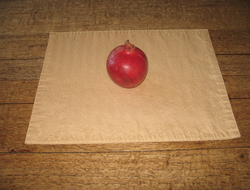Pomegranate: what's in it for your health?
Published: January 07, 2021
The pomegranate, a large round red berry, is the edible fruit of Punica grantum, a deciduous shrub which grows to between 5 and 8 metres in height.
These large berries have a reddish skin and measure between 5-12 cm in diameter. Each berry contains many seeds, between 400 and 1400, surrounded by the aril which is embedded in a white spongy pulp.
The colour of the aril, a watery pulp, can range from white, to deep red or purple.
Nutrition facts
Pomegranate aril juice is a good source of vitmain C, pantothenic acid, potassium, and polyphenols (tannins and flavonoids). Other nutrients include:
- carbohydrate: glucose, fructose, sucrose and fibre
- protein
- fat: unsaturated fatty acids which are contained in the seeds
- vitamin B1, vitamin B2, vitamin B3, and vitamin B6
- vitamin E
- folate
- vitamin K
- calcium, copper, iron, magnesium, manganese, phosphorus, selenium, sodium and zinc
To learn more about the nutrient content of fresh pomegranates and pomegranate juice click on the pomegranate nutrient fact table.
Fresh pomegranate or juice: which is best?
When you can go for the whole fruit versus a juice, take the whole fruit. Whole fruit contains not only nutrients that we know about, but potentially nutrients that have not yet been identified. Loss of nutrients occurs with processing.
Juice does not always contain fibre. Some pomegranate juice products may identify fibres as an ingredient, but this may not necessarilye the same type of fibre as in whole fruit.
Many nutrients such as phytochemicals and antioxidants are lost during processing and frequently, sugar or other sweeteners are added to improve the taste of the juice product.
If you opt for juice select a juice product that is primarily made from the whole fruit and has no additives. I serving of "pure" fruit juice = 125 ml or 1/2 cup.
Health Benefits of the pomegranate
Pomegranate juice is thought to have potential health benefits, and while research is ongoing it is limited.
Much of the research concerns antioxidants and phytochemicals, such as tannins and polyphenols, contained in the juice of the pomegranate berry, but the effects on human health have not yet been conclusively identified.
Pomegranate juice may help to reduce LDL (low density lipoprotein or "bad" cholesterol) oxidation a key factor in initiation of heart disease, and may also help reduce systolic...link to the full article to learn more.

